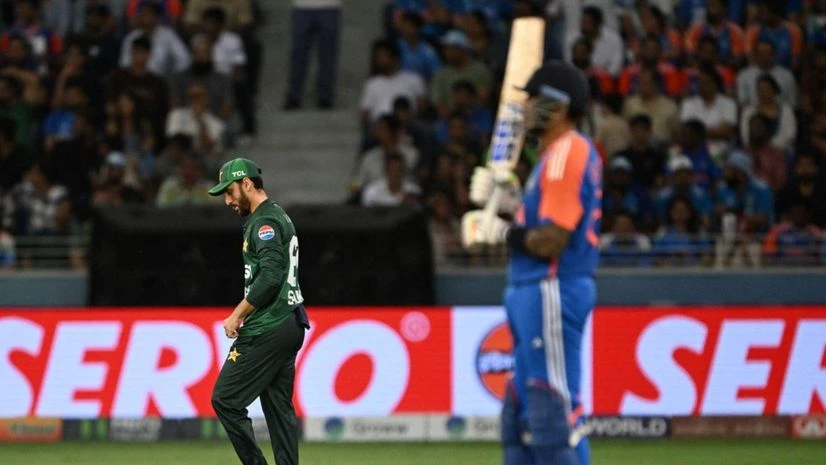
The India-Pakistan cricket rivalry hit a fresh boiling point during their Asia Cup 2025 Super Four encounter at Dubai International Stadium. What would otherwise be a high-pressure game soon turned into a global sensation when the traditional pre- and post-match handshake never materialized. That deliberate no-handshake gesture triggered headlines surrounding “India vs Pakistan handshake controversy”. This shows how politics, sportsman spirit, and popular opinion intersect in cricket’s greatest rivalry.
A High-Octane Confrontation Becomes a Handshake Showdown
India’s dominant seven-wicket win over Pakistan gave all cricketing drama enthusiasts all the cricketing suspense they demand. But the larger tale unfolded when the Indian team refused the handshake invitation from Pakistan at the toss. Then again after the last wicket. That message resonated across social media as the “handshake India vs Pakistan” debate trended on Twitter, Instagram, and YouTube.
In a stark departure from convention, Pakistan captain, Salman Ali Agha, tried to shake hands twice. But this gesture was rebuffed by an Indian team already making its way back towards the pavilion. This snub of the hand was instantaneously the face of the match. It got cricket commentators and fans thinking again about the delicate balance between sporting protocol and national pride.
Political Tensions behind the Handshake Drama
The no-handshake moment cannot be seen in isolation of the broader India-Pakistan geopolitical dynamic. The April 2025 Pahalgam terror attack, which killed 26, and India’s retaliatory cross-border Operation Sindoor set a climate of charged emotions. Social media tags such as #StandWithSoldiers and #NoHandshakeWithPakistan indicate that there was broad public support within India for the team’s action.
India’s captain, Suryakumar Yadav, spoke to the media. “We are dedicating this victory to the victims of recent terror attacks”, said Yadav. “It is about solidarity, not misconduct on the field.” That is what sparked more debate about the role of national tragedies and military intervention on on-field behavior in big events.
International Cricket Council Intervenes
The Pakistan Cricket Board (PCB) lodged an official complaint with the International Cricket Council (ICC). The Board contended that denying a handshake went against the Spirit of Cricket. PCB chairman, Mohsin Naqvi, called for the sacking of match referee, Andy Pycroft, alleging that he had told Pakistan not to start a handshake at the toss.
The ICC formally investigated the “Asia Cup handshake controversy”. They viewed the match footage, notes of the referees, and testimonies of the players. In making this incident a likely violation of the ICC Code of Conduct, the council conveyed that even politically sensitive moments can’t happen outside of cricket’s fundamental values of respect and fair play.
Responses of Ex-Stars and Coaches
Ex-international cricketers and coaches opined on the handshake controversy, bringing sophistication to the “India vs Pakistan sportsmanship debate.”
1. Shoaib Akhtar spoke of de-politicizing the rivalry and asked the players to keep the tension between nation-states separate from the ethos of the game.
2. Pakistan head coach, Mike Hesson, alleged that Pakistan was willing to shake hands but the pavilion door was shut as India walked out.
3. Both Sanath Jayasuriya and Dinesh Karthik pointed out how avoiding the handshake created a disturbing trend for future India-Pakistan matches.
Their authoritative insights underlined the nuance of reconciling genuine national solidarity with the global values of cricket.
Fan Backlash and Boycott Calls
While there were many parts of Indian fans that were complimenting the team’s gesture, there was also a loud minority who were demanding cricket to transcend politics. The hashtag #LetCricketUnite went viral for several hours, especially on Instagram Stories and Facebook status updates, as the fans posted pictures of previous India-Pakistan handshakes which represented unity.
In Dubai, ticket purchases for the ensuing India-Pakistan battle in the Super Four fell, indicative of divided public opinion. Popular fan forums argued boycott measures, with some calling fans to boycott the match altogether, while others maintaining that sports activities should not be turned into political arenas.
What This Means for Future India vs Pakistan Matches
With increased India-Pakistan matches on the cards for the Asia Cup knockout rounds, the handshake issue overhangs. Are both teams going back to the ways of yore, or will folded-arms walk-offs become the new order? Cricket commentators foretell:
1. Tighter ICC regulations on pre-and post-match procedure.
2. Compulsory Spirit of Cricket training for captains and match officials.
3. Increased security and diplomatic liaison for India-Pakistan matches.
These actions could determine the direction of one of cricket’s biggest-viewed rivalries under the pressures of geopolitics and international broadcast.
The Wider Cricket Image Impact
The fallout resonated even beyond the single match. Media platforms throughout Asia and Europe published opinion pieces on whether cricket could ever draw the line between the game and global conflicts. The event raised the importance of an act as simple as a gesture and the lack thereof to create debate around national identity, sporting excellence, and the role of sportsmen as unofficial ambassadors.
Final Thoughts
The India vs Pakistan Asia Cup 2025 clash will be remembered as much for the handshake rather than the game. By declining to shake hands, the Indian team made a small ritual into a big statement, one that will determine how fans, players, and administrators treat future India-Pakistan matches.
As cricket remains popular around the world, the handshake drama reminds us that a gesture means something. Here, the failure to shake hands said everything about where sport, politics, and public passion meet. Whatever follows, the world will be observing and arguing the next installment of one of sport’s fiercest rivalries.


Leave a Reply